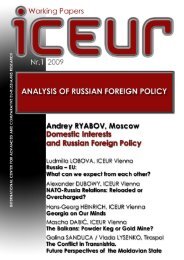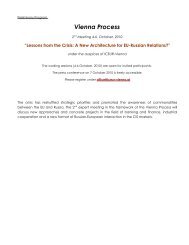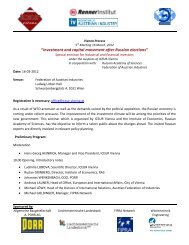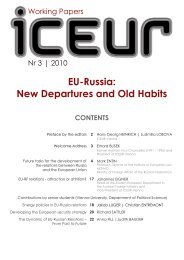Address - International Center for Advanced and Comparative EU ...
Address - International Center for Advanced and Comparative EU ...
Address - International Center for Advanced and Comparative EU ...
You also want an ePaper? Increase the reach of your titles
YUMPU automatically turns print PDFs into web optimized ePapers that Google loves.
Alex<strong>and</strong>er DYNKIN<br />
Global Turmoil: Challenges <strong>for</strong> Russia<br />
Modern Period as Compared With 1970s<br />
Crisis period of 1970s<br />
1. The Vietnam War of the USA<br />
(1965 - 1972, occupation of South<br />
Vietnam till 1975)<br />
2. Financial Crisis in the USA,<br />
Increase of State Debts<br />
(1969 - 1971)<br />
3. Changes in the World Financial System<br />
Abolition of Bretton Woods gold st<strong>and</strong>ard,<br />
devaluation of dollar in 1971 <strong>and</strong> in 1973<br />
4.<br />
5.<br />
6.<br />
7.<br />
8.<br />
Relative Weakening of the American Position<br />
in the World. Relative Strengthening<br />
of the Position of the USSR <strong>and</strong> Japan <strong>and</strong><br />
<strong>EU</strong> (1970s)<br />
Changes in American Society, Anti-War<br />
Movement, Social <strong>and</strong> Economic Re<strong>for</strong>ms<br />
(since 1968 )<br />
Disequilibrium of the world order:<br />
- Growing impact of Chinese factor (Nixon<br />
in Beijing)<br />
- Iranian factor (1978-1979)<br />
- Middle East <strong>and</strong> Israel-Arab problem<br />
Basic arms control treaties negotiated <strong>and</strong><br />
signed:<br />
ABM (1972 - US ‘left’ the treaty in 2002)<br />
SALT-1 (1972) <strong>and</strong> SALT-2 (1979)<br />
Strengthening of the energy levels:<br />
-OPEC (established 10-14/10/1960)<br />
introduced oil embargo in 1973 against US<br />
<strong>and</strong> European states, who supported Israel<br />
in the “October War”<br />
- Oil prices up<br />
Crisis period of 2008-2015<br />
The Wars of the USA in Afghanistan <strong>and</strong> Iraq<br />
(since 2002 in Afghanistan, since 2003 in<br />
Iraq)<br />
Financial Crisis in the USA,<br />
Increase of State Debts<br />
(2008 - 2009)<br />
Changes in the World Financial System<br />
Discussion about the new financial<br />
architecture, new world reserve currency,<br />
possible devaluation of dollar<br />
Relative Weakening of the American Position<br />
in the World. Relative Strengthening<br />
of the Position of China <strong>and</strong> India<br />
(since 2007)<br />
Changes in American Society, President B.<br />
Obama, Social <strong>and</strong> Economic Re<strong>for</strong>ms<br />
(since 2008 )<br />
Disequilibrium of the world order:<br />
- Growing role of China, a new competition<br />
of China<br />
- Iranian factor<br />
- Middle East und Israel-Palestinian problem<br />
(Obama in Cairo)<br />
New chances <strong>for</strong> arms control agreements:<br />
START-2 (expires in Dec. 2009) <strong>and</strong><br />
antiballistic missile defense<br />
Strengthening of the energy levels:<br />
- Competition <strong>for</strong> resources Discussion<br />
over ‘gas OPEC’ (since 2006)<br />
Gas <strong>and</strong> oil transit sc<strong>and</strong>als<br />
- Oil price down<br />
Schedule 1<br />
American society also seems to be ready <strong>for</strong> the implementation of a new set of important re<strong>for</strong>ms.<br />
It is well known that the crisis of 1969-1970 caused significant changes in the international financial system,<br />
in particular, the refusal of the United States to continue the dollar-gold exchange <strong>and</strong> the abolition of the<br />
Bretton Woods System gold-exchange st<strong>and</strong>ard. But no dramatic shifts in the financial system happened: the<br />
dollar has remained the world reserve currency. It seems likely that nowadays the world is moving rather<br />
towards the bi-currency (dollar, euro) system than to a new supranational world reserve currency. The<br />
situation on the world financial markets won't change radically, if, of course, nothing extraordinary happens.<br />
It is true, anyway, that this time the situation is more dangerous than in the 1970s. Terrorism has reached a<br />
global scale; the “arc of instability” has extended from Northern Africa <strong>and</strong> Palestine to Northern Korea,<br />
Indonesia <strong>and</strong> the Philippines. The activities of terrorists in Afghanistan <strong>and</strong> Pakistan <strong>and</strong> eventual conflicts<br />
in the countries of Central Asia cause the biggest concern. The economic <strong>and</strong> social crises in Central Asian<br />
states may already in the nearest future lead to a situation, where many young unemployed people become<br />
members of international terrorist networks. In Russia`s Northern Caucasus the situation also worsens.<br />
Probably, we already hear the first shots of the civil war between violent Islamic fundamentalists <strong>and</strong><br />
moderate Muslims, who are supporting Moscow. All these factors make closer cooperation between all<br />
market democracies necessary: the United States, European Union, Russia, Japan <strong>and</strong> the Republic of Korea<br />
to rebuff terrorists <strong>and</strong> to stabilize the situation in the world.<br />
Moreover, however paradoxical, notwithst<strong>and</strong>ing all shifts <strong>and</strong> changes, the arrangement of the main<br />
political <strong>for</strong>ces of the world in the new millennium, in a way recalls the 1970s. <strong>International</strong> revolutionary<br />
communism has been in fact replaced by Islamic fundamentalism. China plays the role of the second<br />
superpower instead of the USSR. The ambitions of Germany <strong>and</strong> France are implemented by the European<br />
IC<strong>EU</strong>R-Vienna Working Papers 2|2009 5









